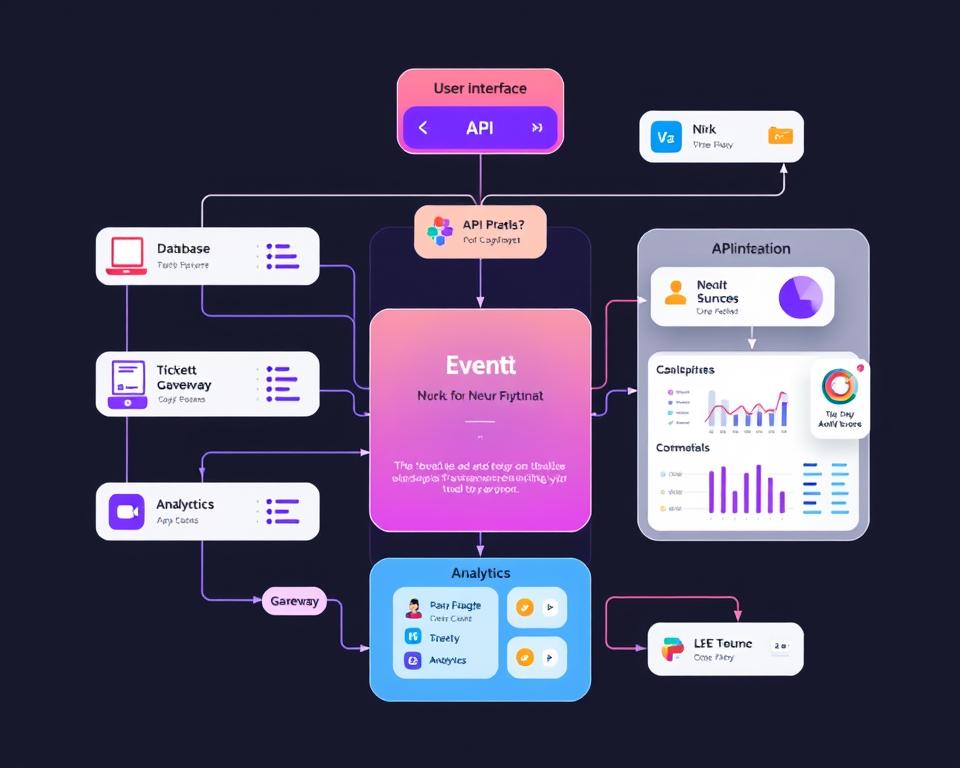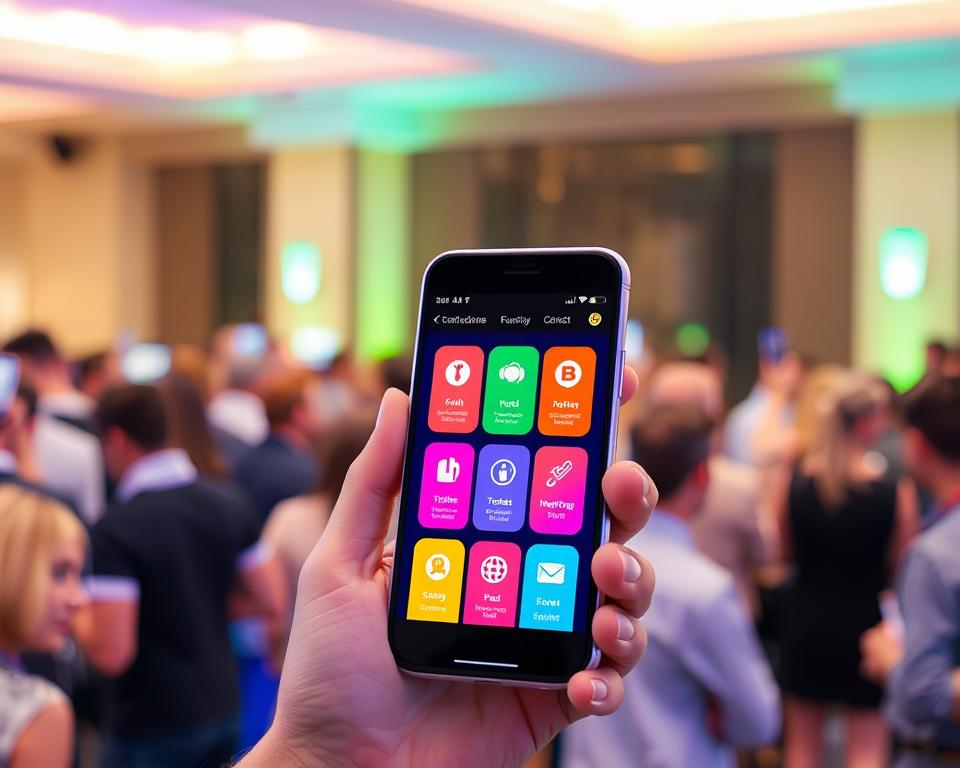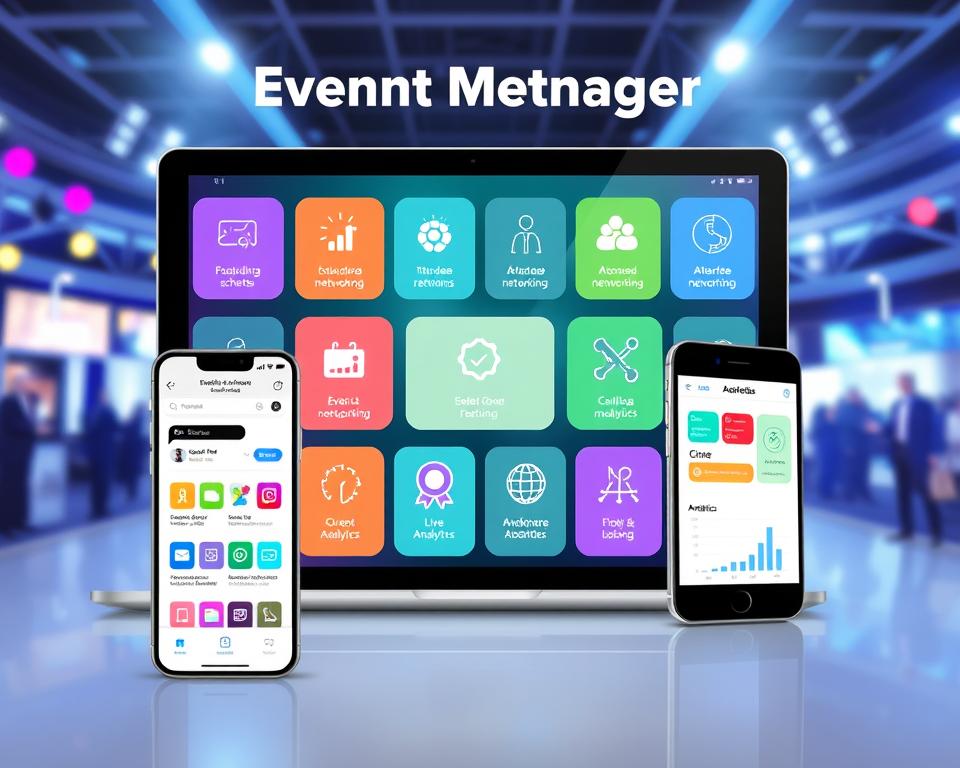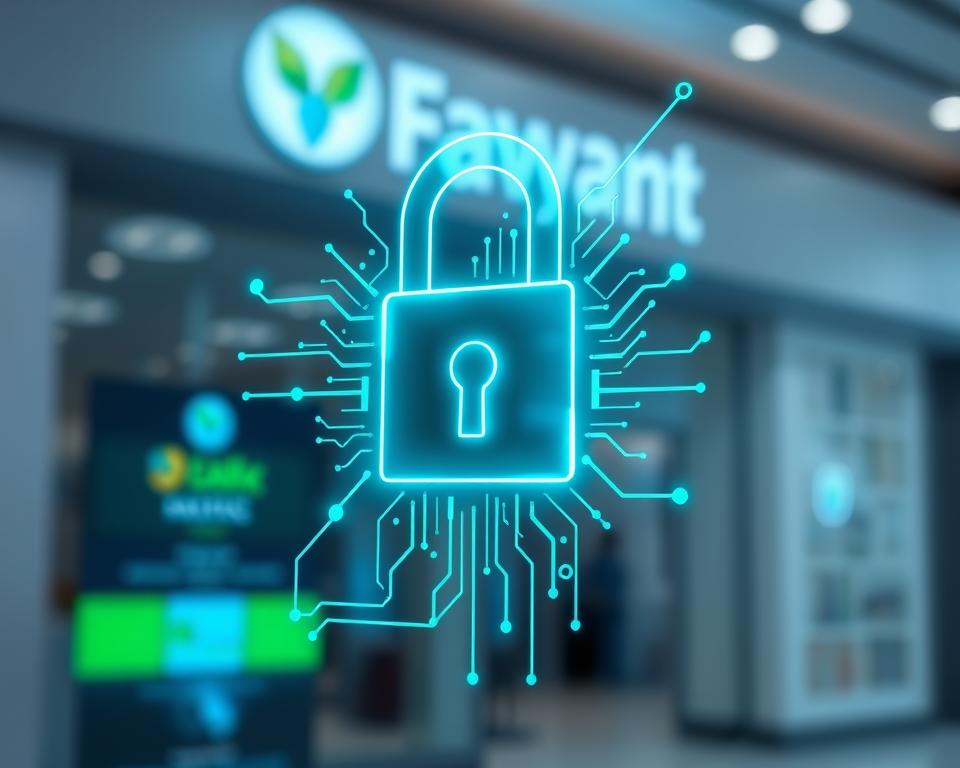The world of event planning is changing fast. Creating a top-notch mobile app is key for event organizers and businesses to stay ahead. As we get closer to 2024, event tech is set to make big leaps. This is thanks to the need for easy, user-friendly, and data-rich event management tools.
This article will cover the main features and things to think about for the next big event management apps. We’ll help your app stand out and meet the changing needs of event planners, attendees, and others involved. We’ll look at market trends, the tech needed, and how to design a great user experience. This will guide you in making an event management app that’s ready for the future.
Table of Contents
Key Takeaways
- Explore the current trends and growth projections in the event management app market
- Understand the essential technology stack required for building a robust event management app
- Discover the user experience design principles that will enhance the app’s usability and engagement
- Learn about the core functionalities and advanced features that will set your event management app apart
- Gain insights into the importance of real-time communication, payment integration, and data analytics for event apps
Understanding the Event Management App Market in 2024
The event industry has seen big growth lately. This is because people want digital tools to make planning and managing events easier. As we get closer to 2024, the event tech market size is expected to keep growing. This growth means there will be more chances for new and exciting event management apps.
Current Market Trends and Statistics
Reports say the global event industry growth will reach new levels soon. Trends include more people using mobile event apps. There’s also a push for using new tech like augmented reality and artificial intelligence. Plus, making experiences more personal for attendees is a big focus.
A study by a top market research firm found that event app competitors are working hard to get more of the market. They’re focusing on making apps better for users, improving event organization, and using data to make smart decisions.
Growth Projections for Event Tech
- The global event tech market is expected to grow by over 12% from 2022 to 2027.
- More people are using event management software on cloud platforms and mobile devices. This is helping the market grow.
- The Asia-Pacific region is expected to see the fastest growth. This is because the event industry is quickly becoming more digital in these countries.
Key Market Players Analysis
| Company | Market Share | Key Offerings |
|---|---|---|
| Cvent | 25% | End-to-end event management platform, venue sourcing, and attendee management |
| Eventbrite | 18% | Ticketing and registration platform, event promotion, and data analytics |
| Bizzabo | 12% | Comprehensive event management solution, mobile app, and attendee engagement tools |
The event management app market is very competitive. Top players are always coming up with new ideas. They want to meet the changing needs of event planners and attendees.
Essential Technology Stack for Event Management Applications
Building a strong event management app needs a well-chosen technology stack. This stack includes app development tools for a great user interface. It also has a solid event app architecture for growth, reliability, and smooth use.
Cloud technologies are a big part of this stack. They make event apps flexible, scalable, and cost-effective. This lets organizers easily meet changing needs and event plans.
The tech stack must also have key parts for a full event management solution:
- Scalable backend systems for big event data and user actions
- Frontend frameworks for a good user experience and fast response
- Strong database solutions for event info
- Secure payment gateways for easy ticket sales and sign-ups
- Real-time communication for updates and engagement
- Analytics and reporting tools for event success and future improvements
| Technology | Purpose | Example Solutions |
|---|---|---|
| Backend Systems | Handling event data, user interactions, and server-side logic | Node.js, Ruby on Rails, Django |
| Frontend Frameworks | Building visually appealing and responsive user interfaces | React, Angular, Vue.js |
| Database Solutions | Storing and managing event-related information | MongoDB, PostgreSQL, MySQL |
| Cloud Services | Providing scalability, flexibility, and cost-efficiency | AWS, Google Cloud, Microsoft Azure |
| Payment Gateways | Enabling secure and seamless ticket sales and registration | Stripe, PayPal, Braintree |
| Communication Channels | Keeping attendees informed and engaged in real-time | WebSockets, Push Notifications, SMS |
| Analytics and Reporting | Measuring event performance and optimizing future events | Google Analytics, Mixpanel, Segment |
Choosing and combining these key technologies helps developers make a complete and growing event app. It meets the changing needs of organizers and attendees.
“The key to building a successful event management app is to focus on creating a seamless and engaging user experience, powered by a robust and flexible technology stack.”
User Experience Design Principles for Event Apps
Creating a great event management app needs a deep understanding of UI/UX design principles. Designers must focus on making the app easy to use, navigate, and accessible. This ensures a top-notch user experience.
Interface Design Best Practices
The app’s design should be attractive, simple, and straightforward. Use a clean layout, clear icons, and smooth user paths. This helps attendees move through the event easily. Use event app usability tips to make the design efficient and engaging.
Navigation Flow Optimization
The app’s navigation should be easy and direct. Users should quickly find what they need. Use a clear structure, consistent patterns, and clear labels. Test and improve the navigation flow to enhance the user experience.
Accessibility Considerations
Accessibility is key in accessible app design, serving users with different abilities. Add features like text-to-speech, high-contrast options, and keyboard-only navigation. This makes the app accessible to everyone, creating a welcoming experience for all.
“Designing for accessibility is not an afterthought, but a fundamental requirement for creating a truly inclusive and engaging event app experience.”
Registration and Ticketing System Integration
Event organizers are working hard to make things easier for attendees. They use event registration software and online ticketing systems. These tools make signing up simple and give insights into who’s coming.
Event apps now offer different ticket levels. You can buy everything from basic tickets to VIP passes. It’s also easier to sign up in groups, which helps both attendees and event staff. Plus, the system makes checking in and controlling access smooth and secure.
| Feature | Benefit |
|---|---|
| Multi-tier Ticket Options | Cater to diverse attendee preferences and budgets |
| Group Registration | Simplify the registration process for large groups |
| Automated Attendee Data Management | Streamline check-in and access control |
With these features, event apps can make events better for everyone. They help organizers work more efficiently and get useful data for future events.
Creating an App for Event Management in 2024: Key Features
Creating an event management app in 2024 needs careful thought. You must consider both basic and advanced features. These features together make a great app that meets the needs of event planners and attendees.
Core Functionality Requirements
The heart of a good event app is its essential tools. These include event app features like event calendars, ticketing systems, and venue maps. These tools help event planners work better and improve the experience for attendees.
Advanced Feature Implementation
To stand out, add advanced event planning tools to your app. Features like real-time chat, personalized agendas, and interactive floor plans make the app better. Also, app integration with other tools, like payment systems, makes the app more useful for organizers.
Integration Capabilities
In today’s digital world, it’s important for an event app to work well with other platforms. This app integration includes syncing calendars, social media, and vendor systems. It helps organizers work more efficiently and gives a better event experience.
| Core Functionalities | Advanced Features | Integration Capabilities |
|---|---|---|
|
|
|
“Integrating advanced features and seamless app integration is key to creating a truly differentiated event management solution in 2024.”
Real-time Communication and Notification Systems
In today’s event world, talking to attendees is crucial. Event apps with strong real-time chat and alerts make a big difference. They keep attendee communication smooth and fun from start to finish.
Next-gen event apps let people chat instantly. This event messaging helps share info fast. It makes everyone feel connected and helps events run smoothly.
- Facilitate instant messaging between organizers, speakers, and attendees
- Enable organizers to send targeted push notifications to attendees with updates, schedule changes, or important announcements
- Integrate interactive Q&A sessions and live polls to encourage attendee engagement and feedback
Also, push notifications are great for keeping people in the loop. Organizers can send out updates, reminders, and key info. This keeps attendee communication clear and on track.
“Effective communication is the key to a successful event. An event app with robust real-time messaging and notification capabilities can make all the difference in keeping attendees informed and engaged.”
By focusing on real-time chat and alerts, event planners can create a better experience. This leads to happier and more engaged attendees.
Payment Gateway Integration and Security Measures
Adding a secure payment gateway is key for a good event management app in 2024. More people are using digital payments, so keeping financial data safe is very important. This part talks about the best ways to handle payments, keep data safe, and follow rules.
Payment Processing Solutions
Choosing the right payment solution for your app is crucial. Look for secure payment processing options like Stripe, Braintree, and PayPal. They offer strong security and PCI compliance to protect user data. These services make it easy to accept many payment types, like credit cards and mobile payments.
Security Protocol Implementation
Keeping your app’s transactions safe is a must. Use the latest encryption, like SSL/TLS, to protect data when it’s sent. Also, add two-factor authentication and fraud detection to make accounts and transactions even safer.
Compliance Requirements
Your app needs to follow strict rules, like the Payment Card Industry Data Security Standard (PCI DSS). Learn about these rules and work with your payment gateway to keep your app PCI compliant at all times.
| Payment Gateway | Key Features | PCI Compliance |
|---|---|---|
| Stripe |
|
PCI DSS Level 1 compliant |
| Braintree |
|
PCI DSS Level 1 compliant |
| PayPal |
|
PCI DSS Level 1 compliant |
By picking a secure payment gateway, using strong security, and following rules, your app can offer a safe and easy way to handle money. This makes it better for both organizers and attendees.
Event Analytics and Reporting Dashboard
In the fast-paced world of event management, analyzing data and getting insights is key. This helps organizers improve their plans and give great experiences. The event analytics and reporting dashboard in event apps is essential. It gives organizers a deep look at how their event is doing.
The core of this feature is event data analysis. It covers many metrics like how engaged attendees are, how far the event reaches, and how happy people are. With advanced data visualization, organizers can easily follow and understand these performance metrics. This lets them make smart choices to make their event a success.
The reporting dashboard shows data in a clear and pretty way. It also lets organizers customize the analytics for each event. They can watch and study attendee insights in real-time or after the event. This helps them find trends and see where they can get better.
| Key Performance Indicators | Metric Descriptions |
|---|---|
| Attendee Engagement | Measures the level of interaction and participation from event attendees, including session attendance, networking activities, and content consumption. |
| Event Reach | Tracks the event’s online and offline visibility, including social media engagement, website traffic, and media coverage. |
| Satisfaction Ratings | Captures the overall satisfaction and feedback from attendees, enabling organizers to identify areas for improvement and enhance future event experiences. |
By adding detailed event analytics and reporting, event apps help organizers make smart choices. They can improve their event plans and give amazing experiences that meet or beat what attendees expect.
Social Media Integration and Marketing Tools
In the fast-paced world of event management, using social media and marketing automation is key. Event apps in 2024 will connect with top social platforms. This lets organizers reach more people and build strong connections with their audience.
Social Platform Connectivity
Top event apps will link up with big social media sites like Facebook, Instagram, Twitter, and LinkedIn. This makes it easy for event planners to share news and multimedia. It helps them reach more followers and get their events talked about online.
Marketing Automation Features
Next-gen event apps in 2024 will have cool marketing automation features. They’ll send out emails, push notifications, and suggest content with AI. This makes it easier for organizers to keep in touch with their audience and boost ticket sales.
With social media and social media marketing tools, event apps in 2024 will help organizers get their events noticed. They’ll engage their audience and increase event success.
Venue Management and Floor Plan Features
Event organizers are working hard to make experiences better for everyone. They use virtual venue tours and interactive floor plans in event apps. These tools help plan events better and make the most of the venue.
Event apps can show virtual venue tours. They use 360-degree views to let people see the venue. This helps attendees know the layout and feel the atmosphere before the event.
Interactive floor plans are also key. They let organizers see the venue and plan it out. This way, they can arrange seats and booths to fit more people and keep things flowing smoothly.
- Virtual venue tours provide attendees with a comprehensive understanding of the event space.
- Interactive floor plans allow organizers to visualize and optimize the event layout, including seating arrangements.
- Seamless integration of these features within event management apps enhances the overall planning and execution processes.
“Effective venue management and floor plan design are essential for creating memorable and successful events. Event management apps that offer these capabilities empower organizers to deliver exceptional experiences for their attendees.”
Mobile-First Development Approach
In the fast-paced world of event management, a mobile-first approach is a big change. With more people using mobile app development, making sure your app works well on phones is key. By focusing on responsive web design and cross-platform compatibility, event planners can give users a smooth experience on the move.
Responsive Design Implementation
Responsive design is at the heart of mobile-first development. It makes sure your app works well on all kinds of screens. This means your app looks great and works well on phones, tablets, and more. It makes sure users can easily find what they need, no matter their device.
Cross-Platform Compatibility
Today, it’s important to make your app work on many platforms. By making your app cross-platform compatible, you can reach more people. This way, whether they use iOS, Android, or web, your app works well for everyone.
By going mobile-first, event planners can make apps that look good and work well. This lets them offer the modern, mobile experiences that today’s attendees want.
“Developing a mobile-first event management app is no longer a luxury, but a necessity in today’s digital landscape.”
Budget Management and Financial Tracking
Planning and running successful events is complex. Managing the budget and tracking finances are key parts of this process. In 2024, event management apps will have strong event budgeting tools and detailed expense tracking features. These will make managing finances easier.
Event management apps will let users create detailed event budgets. They can input expected costs like venue rental, catering, and marketing. The app will then show real-time financial reporting on the budget status. This helps event organizers keep track of spending and make smart financial decisions.
| Feature | Description |
|---|---|
| Budget Creation | Comprehensive tools to build and manage event budgets, including the ability to input anticipated expenses and track actual spending. |
| Expense Tracking | Streamlined process for logging and categorizing event-related expenses, providing a clear overview of financial outgoings. |
| Financial Reporting | Detailed reporting on budget status, spending patterns, and overall financial performance of the event, allowing for informed decision-making. |
With these event budgeting tools, expense tracking, and financial reporting features, event management apps in 2024 will help organizers control their finances. This ensures events are successful and profitable.
Attendee Engagement and Networking Features
In today’s fast-changing world, making events engaging and networking key is crucial. As we move towards 2024, event apps will bring new tools and features. These will make the experience for attendees better than ever.
Interactive Tools Implementation
Event management apps in 2024 will focus on interactive tools to boost engagement. You can expect live polls, Q&A sessions, and gamification. These features will make events more fun and interactive.
Networking Functionality
Event apps will also improve attendee networking in 2024. They will have features like smart matchmaking, virtual business cards, and personalized schedules. These tools will help attendees connect and build professional relationships easily.
With these new features, event apps in 2024 will change the game. They will turn events into places where people can collaborate and grow.
Testing and Quality Assurance Processes
Creating a top-notch event management app needs careful testing and quality assurance (QA). A detailed testing plan is key to make sure the app works well and performs at its best. This part talks about the main testing methods, QA practices, and ways to improve app performance.
Comprehensive Testing Methodology
Good app testing uses many methods, like unit testing and integration testing. It also includes end-to-end (E2E) testing and user acceptance testing (UAT). A solid testing plan helps find and fix problems early, making the app better for users.
- Unit testing: Checks if each app part works right
- Integration testing: Makes sure different app parts talk to each other well
- E2E testing: Tests how the app works in real-life situations
- UAT: Gets feedback from real users to make the app better
QA Best Practices
Following QA best practices is also crucial for a high-quality event management app. These practices include keeping an eye on app performance and fixing problems before they happen. They help ensure your app is top-notch and easy to use.
| QA Practice | Description |
|---|---|
| Performance Optimization | Finds and fixes slow parts of the app for better user experience |
| Automated Testing | Uses automated tests to find problems early and often |
| Continuous Integration and Deployment | Makes sure testing and updates are part of the app’s development |
By using these testing methods and QA practices, you can make an event management app that works smoothly and reliably. This will help make your event a success.
Conclusion
The world of event management apps is changing fast. This change is driven by the need for smooth digital experiences. It also comes from event organizers wanting to stay ahead.
Technology is making a big difference in event management. It brings features like easy registration and real-time updates. These tools will lead the way in digital change.
The event app development field is growing. To keep up, companies need to be flexible and creative. By using the latest tech, event pros can give amazing experiences to their guests.
As the event world changes, using full event app features is key. This helps event businesses grow and succeed. Technology lets organizers work better, engage more, and get valuable insights.


















